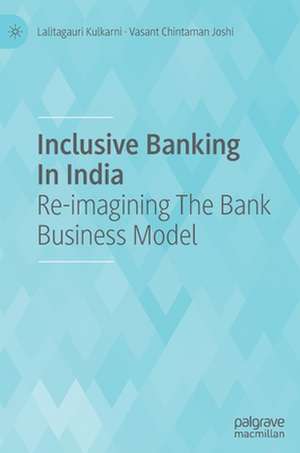Inclusive Banking In India: Re-imagining The Bank Business Model
Autor Lalitagauri Kulkarni, Vasant Chintaman Joshien Limba Engleză Hardback – 2 iun 2021
The book proposes a distinct change to the existing business model, examines the bank business model for inclusion and how the banks can and should treat the micro lending clientele as their core client base to counter the issues of profitability and competition in today’s banking sector. It also discusses some of the latest initiatives in inclusive finance and the importance of entrepreneurship development experiments in India and their efficacy in comparison with the micro-lending model.
Preț: 998.66 lei
Preț vechi: 1217.87 lei
-18% Nou
Puncte Express: 1498
Preț estimativ în valută:
191.12€ • 198.79$ • 157.78£
191.12€ • 198.79$ • 157.78£
Carte tipărită la comandă
Livrare economică 14-28 aprilie
Preluare comenzi: 021 569.72.76
Specificații
ISBN-13: 9789813367968
ISBN-10: 9813367962
Pagini: 195
Ilustrații: XIX, 195 p. 44 illus., 37 illus. in color.
Dimensiuni: 148 x 210 mm
Greutate: 0.41 kg
Ediția:1st ed. 2021
Editura: Springer Nature Singapore
Colecția Palgrave Macmillan
Locul publicării:Singapore, Singapore
ISBN-10: 9813367962
Pagini: 195
Ilustrații: XIX, 195 p. 44 illus., 37 illus. in color.
Dimensiuni: 148 x 210 mm
Greutate: 0.41 kg
Ediția:1st ed. 2021
Editura: Springer Nature Singapore
Colecția Palgrave Macmillan
Locul publicării:Singapore, Singapore
Cuprins
Chapter 1: Inclusive Banking: Concept, Evolution, and Current Policy.- Chapter 2: Inclusive Finance and Economic Growth: The Theoretical Underpinnings.- Chapter 3: Inclusive Finance and Commercial Banks.- Chapter 4: The Non-Bank Sources of Micro lending In India.- Chapter 5: Inclusive Banking a Political Economy Approach.- Chapter 6: Role of Government.- Chapter 7: New Developments in Inclusive Finance.- Chapter 8: The Way Forward.
Notă biografică
Lalitagauri Kulkarni is a faculty member at the Department of Economics at Gokhale Institute of Politics and Economics, India. Her research in Inclusive Banking and Development, Financial Economics, Macro-financial Policy, and Insurance Economics has been published in various reputed national and international journals. She has experience of working on applied research under various funded research projects.
Vasant C. Joshi is Founder Director of the VCJ Institute of Research and Development, India. He has vast experience in the banking field as General Manager (Retd.), Bank of India, and Director (Retd.), National Insurance Academy. He has authored a number books on banking and finance including Managing Indian Banks: Challenges Ahead, Digital Finance Bits and Bytes and a comprehensive report on Management Practices of MFIs for the Indian Council of World Affairs.
Vasant C. Joshi is Founder Director of the VCJ Institute of Research and Development, India. He has vast experience in the banking field as General Manager (Retd.), Bank of India, and Director (Retd.), National Insurance Academy. He has authored a number books on banking and finance including Managing Indian Banks: Challenges Ahead, Digital Finance Bits and Bytes and a comprehensive report on Management Practices of MFIs for the Indian Council of World Affairs.
Textul de pe ultima copertă
This book addresses the gaps in the present institutional structure of inclusive finance framework in India. It provides a comprehensive review of the role of banks in financial inclusion policy and micro-finance landscape in India at present. It identifies the key issues within the banking system which prove to be obstacles in the way of achieving financial inclusion and sustainable growth. The book conceptualizes inclusive banking, delves into the theoretical foundations thereof and suggests an institutional framework to avoid overlapping of their functions in order to ensure profitability. It reviews the existing market structure and competition in the inclusive finance arena while considering the role of banks, micro-finance institutions and SHGs in financing the poor.
The book proposes a distinct change to the existing business model, examines the bank business model for inclusion and how the banks can and should treat the micro lending clientele as their core client base to counter the issues of profitability and competition in today’s banking sector. It also discusses some of the latest initiatives in inclusive finance and the importance of entrepreneurship development experiments in India and their efficacy in comparison with the micro-lending model.
Lalitagauri Kulkarni is a faculty member at the Department of Economics at Gokhale Institute of Politics and Economics, India. Her research in Inclusive Banking and Development, Financial Economics, Macro-financial Policy, and Insurance Economics has been published in various reputed national and international journals. She has experience of working on applied research under various funded research projects.
Vasant C. Joshi is Founder Director of the VCJ Institute of Research and Development, India. He has vast experience in the banking field as General Manager (Retd.), Bank of India, and Director (Retd.), National Insurance Academy. He has authored a number books on banking and finance including Managing Indian Banks: Challenges Ahead, Digital Finance Bits and Bytes and a comprehensive report on Management Practices of MFIs for the Indian Council of World Affairs.
Lalitagauri Kulkarni is a faculty member at the Department of Economics at Gokhale Institute of Politics and Economics, India. Her research in Inclusive Banking and Development, Financial Economics, Macro-financial Policy, and Insurance Economics has been published in various reputed national and international journals. She has experience of working on applied research under various funded research projects.
Vasant C. Joshi is Founder Director of the VCJ Institute of Research and Development, India. He has vast experience in the banking field as General Manager (Retd.), Bank of India, and Director (Retd.), National Insurance Academy. He has authored a number books on banking and finance including Managing Indian Banks: Challenges Ahead, Digital Finance Bits and Bytes and a comprehensive report on Management Practices of MFIs for the Indian Council of World Affairs.
Caracteristici
Provides a new approach to bring the desired change in the policy to effectively immerse the marginalized population into mainstream finance for the ultimate goal of poverty alleviation Discusses the theoretical framework behind the need for inclusive banking Envisages a potential for a coordinated approach for micro - lending (project and participatory) with Government agencies at the Central , State , and district level
